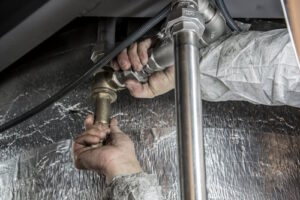 Homeownership comes with many responsibilities, among all of those responsibilities, the maintenance of the property’s plumbing systems is crucial. Plumbing is an essential component of any residential building, and requires particular attention due to its critical role in providing clean water and disposing of waste safely. Regular plumbing inspections are necessary for maintaining a home’s functionality, health, and safety. This article dives into the significance of these inspections, the benefits they provide, and the potential risks.
Homeownership comes with many responsibilities, among all of those responsibilities, the maintenance of the property’s plumbing systems is crucial. Plumbing is an essential component of any residential building, and requires particular attention due to its critical role in providing clean water and disposing of waste safely. Regular plumbing inspections are necessary for maintaining a home’s functionality, health, and safety. This article dives into the significance of these inspections, the benefits they provide, and the potential risks.
Understanding Plumbing Inspections
A plumbing inspection involves a thorough check of all the water pipes, fixtures, drains, and associated appliances in a home to ensure they are in good working condition and meet the necessary safety standards. This process is typically conducted by a licensed plumber who can identify current issues and potential future problems that might require attention.
Key Benefits of Regular Plumbing Inspections
1. Prevention of Major Repairs
One of the primary benefits of regular inspections is the prevention of major plumbing failures that can be costly to repair. Small leaks and blockages if left unchecked, can evolve into more significant issues like burst pipes or severe water damage. Early detection during an inspection can lead to minor repairs that are less invasive and more cost-effective.
2. Extended Lifespan of Plumbing Systems
Routine inspections can significantly extend the lifespan of plumbing systems. Homeowners can avoid the stress and expense of premature replacements by ensuring that all components are functioning correctly. Regular maintenance also ensures that plumbing systems operate more efficiently, which can reduce wear and tear over time.
3. Improved Water Quality
Corroded pipes or fixtures can deteriorate water quality, leading to health concerns. During an inspection, plumbers check for rust and sediment build-up that could compromise water quality. Addressing these issues promptly ensures that the household water supply remains clean and safe for consumption.
4. Increased Property Value
A well-maintained plumbing system enhances a home’s market value. Prospective buyers are more inclined to invest in a property that has a sound plumbing system with a documented history of regular inspections and upkeep.
5. Energy and Water Efficiency
Leaky faucets and toilets can waste a significant amount of water, leading to higher utility bills and environmental strain. Regular inspections can identify such inefficiencies, and correcting them can lead to substantial savings on water and energy bills. Efficient systems also contribute to the conservation of these vital resources, aligning with environmental sustainability efforts.
What Happens During a Plumbing Inspection?
- A visual examination of pipes, faucets, showers, and toilets to check for signs of distress.
- Testing water pressure to detect issues that may be affecting water flow and system performance.
- Checking appliances such as water heaters, dishwashers, and washing machines for proper connection and functioning.
- Inspecting sewer lines using special cameras to look for obstructions or damage that could cause backups or other serious issues.
- Assessment of sump pumps and drains in basements or crawl spaces to prevent flooding and water damage.
When to Schedule Plumbing Inspections
 Homeowners should consider a plumbing inspection at least once a year. However, older homes with aging plumbing systems, homes with a history of plumbing problems, or properties with trees encroaching on sewer lines might require more frequent checks. Additionally, it is advisable to have an inspection before purchasing a home and after any major home renovations.
Homeowners should consider a plumbing inspection at least once a year. However, older homes with aging plumbing systems, homes with a history of plumbing problems, or properties with trees encroaching on sewer lines might require more frequent checks. Additionally, it is advisable to have an inspection before purchasing a home and after any major home renovations.
Choosing a Plumbing Inspection Service
When selecting a plumbing inspection service, homeowners should seek licensed, experienced professionals with positive reviews and credible references. It’s essential to choose someone who provides detailed inspection reports and can clearly explain any necessary repairs or recommended maintenance. You can also Contact H3 Plumbing & Drains if you have questions about a plumbing inspection.
Regular plumbing inspections are a preventative measure that saves money, increases safety, and enhances the overall quality of life in a home. They help avoid the inconvenience of unexpected plumbing emergencies and the high costs associated with major repairs. For homeowners, investing in routine plumbing inspections is a wise decision that ensures their home remains a comfortable and safe place to live.
